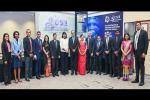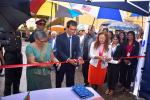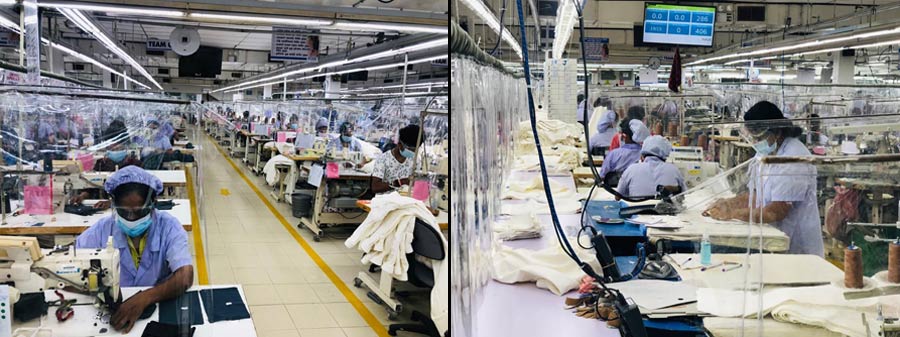The entire apparel industry is doing everything in its power to address these concerns by working in close consultation with the Ministry of Health (MOH) and other public authorities, in order to ensure that all possible measures are in place to ensure the health and safety of employees.
In granting apparel the status of an essential service is of critical importance to the national economy.
The Government has taken into consideration the measures implemented by the industry as they do have a significant impact in mitigating the risk of transmission of Covid-19 infections, including the Delta variant.
Outlined below is a synopsis of the extensive measures taken in facilities which have been granted permission to operate:
Priority Vaccinations - With the support of Hon. Namal Rajapaksa, assistance by public health authorities and the Sri Lankan Army, 90% of workers have received their first dose of the COVID-19 vaccine, and over 50% have received their second dose.
Specifically in the BOI-operated facilities – which accounts for approximately 90% of the total workforce - more than 70% of employees have received their second dose.
In the coming weeks, the entire apparel industry workforce will be completely vaccinated.
Continuous monitoring - In line with established protocols by the MOH and the Ministry of Labour, factories carry out checks at all facilities.
Workers are screened for any symptoms before they are allowed to enter factory premises.
Factories ensure social distancing and have dedicated areas for people to eat, toilet facilities etc.
Several plants also offer additional measures such as steam inhalations, sanitization stations, herbal and other healthy hot drinks etc.
Anyone with any visible symptom is moved to a medical facility immediately for more in-depth testing.
Temperature checks are also conducted randomly and frequently during the day on shop floors, and appropriate action is taken if necessary.
Testing - Plants adhere to the testing protocols issued by the Ministry of Health, which includes random testing and daily reporting to the MOH of these results.
These are also discussed and shared with the local health authorities through an online mechanism that has been set up.
Further, local health authorities are in close contact with plants to help ensure that the workplace is as safe as practically possible.
Additionally, there is a robust mechanism in place to hold any facility that violated health protocols responsible for any violation.
Healthcare Infrastructure - The industry has supported the establishment of 11 Intermediate Care Centres with close to 4,500 beds available for employees.
Another two centres are under construction, which will bring the number of beds to 5,000. Individual factories are adding to this infrastructure.
The importance of the sector to its economy as a provider of jobs, a source of investment and as an export-earner is well-accepted.
During this pandemic, the industry's economic responsibility gains additional importance.
Workers have responded magnificently in response to the protective measures that companies have taken.
More than 80% of the workforce - the vaccinated group - has returned to work.
“We appreciate their determination and commitment to putting the economy back on its feet at this difficult time.
For our part, we will do everything in our power to ensure they stay safe and protected, by pandemic-proofing workspaces, making sure they are all vaccinated completely and that the protective measures and healthcare infrastructure is available to them and their families” said Secretary General of JAAF, Tuli Cooray.
The government has instituted a lockdown for the next ten days while exempting essential services, including the apparel industry.
This is to keep the economy moving and ensure momentum is maintained on both fronts; keeping people safe and the wheels of the economy turning without compromising on safety.
It is vital that in expressing concerns, stakeholders do not induce unwarranted panic and fear among the workforce involved in essential services.
























